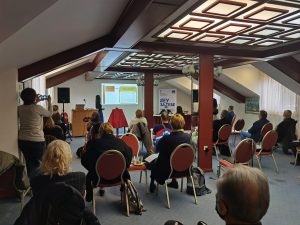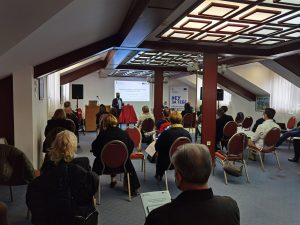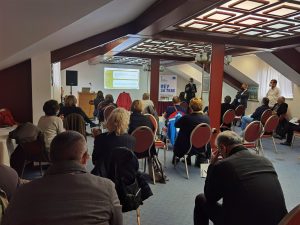PILOTING OF THE RECOGNITION OF PRIOR LEARNING PROCEDURE TO START SOON
Piloting the process of recognition of prior learning (RPL) will begin in May, and after it is introduced into the system, the procedure will enable those who have acquired knowledge and skills outside the education system, through work or life experience, to achieve qualification – was announced at a workshop held in Palić, where preparations for piloting that have been carried out so far, with the support of the project “Development of an integrated system of national qualifications”, were presented.
After more than a year of preparations that included the development of regulations, preparation of procedures, programmes, assessment instruments and necessary documentation, training, preparation for accreditation – everything is ready for the most critical step: selecting candidates and checking how the proposed solutions work in practice.
– Based on the Law on the National Qualifications Framework adopted in 2018, we have established the Qualifications Agency, the Council for the National Qualifications Framework, and the sector skill councils. What is particularly important now are bylaws, regulations, and methodologies – documents developed with Project support, which helps us connect the world of work with the education system. The goal is to provide a much faster transfer to the world of work and social inclusion for people who have worked and acquired knowledge and skills, but do not have the appropriate certificates for that – said Mrs Gabriela Grujić, Assistant Minister for Dual Education, at the press conference organised within the workshop.
Twenty-two vocational schools will participate in RPL piloting. The first candidates will be adults who have worked without certificates as reinforcement workers, masons, construction machinery operators, bakers, butchers, cooks, carpenters, and fashion tailors. These qualifications were chosen by the Ministry of Education, Science and Technological Development in cooperation with the National Employment Service, given that data indicate that the most significant number of unemployed without qualifications have these work experiences and that there is a need for qualified personnel in these areas.
– In 2020, Serbia referenced its National Qualifications Framework (NQFS) with the European Qualifications Framework. Now we are part of the European labour market, which will significantly expand in the coming period. The speed of knowledge transfer is what is most important, and we are trying to quickly implement new initiatives and solutions to improve education, and thus contribute to the economic development of Serbia – said Mrs Grujić.
The RPL procedure begins when someone who has years of working experience wants to check and certify the knowledge acquired in that way. In the school, which has the approval to conduct the RPL procedure, such a person will first receive detailed information about the process, and then, if he/she decides to enter the process, will receive support – counselling and guidance through self-assessment and assistance for portfolio development. Based on these documents, the school will prepare a report on the candidate with an assessment plan, organise an exam to assess the candidate’s learning outcomes and competencies, and issue a public document – a certificate of qualification or testimonial of competence (partial qualification). From the candidate’s application to the issuance of the certificate, the whole procedure should last a maximum of 3 months.
– In that way, we will provide a faster transfer to the world of work, social inclusion, a higher level of self-confidence and self-esteem – concluded Mrs Gabriela Grujić.
Qualifications acquired through work experience and confirmed through the RPL on the labour market will be equal to the qualification acquired through formal education. For this to be possible, the recognised competencies must be in line with the qualification’s standard.
– Standards are the basis for the RPL process because they enable the comparability of qualifications acquired in different ways. The Qualifications Agency adopted 32 standards last year – said the director of the Agency, Mr Časlav Mitrovic.
The Institute for the Improvement of Education also provided excellent support to the pilot schools in preparing programs and instruments to evaluate candidates.
– Recognition of prior learning is a missing link, and with this, we have completed pre-university vocational education. The Institute will continue to provide support by developing assessment instruments and training for assessors and schools that will conduct the RPL process – said Gojko Banović, head of the Centre for Vocational and Adult Education.
Interest among individuals and employers already exists, was concluded at the workshop, and inquiries have already begun to reach the pilot schools.
– The Polytechnic School will, we hope, be a regional RPL centre for occupations in the field of geodesy and civil engineering that are included in the piloting. These occupations are in short supply, and there is great interest in them – said Mr Iso Planić, director of the Polytechnic School.
The Ministry of Education, Science and Technological Development is piloting the RPL procedure with the support of the project “Development of an integrated system of national qualifications in the Republic of Serbia”. Once the proposed solutions are tested in practice, the RPL process should become a procedure through which verified secondary vocational schools would be able to check and certify qualifications at levels II, III and V of the National Qualifications Framework of Serbia (NQFS).
– By piloting the recognition of prior learning, we are entering the final phase of the project “Development of an integrated system of national qualifications”. Although the most visible, this is just one of the project activities realised so far. With the support of the project, the implementation of a system solution has begun, which requires that all new qualifications entering the NQFS must have a qualification standard that clearly defines the knowledge, skills, and abilities necessary to obtain a qualification. Also, a Register of Qualifications is under development, and soon an electronic platform containing all national qualifications and information on pathways for their acquisition will be available to citizens. Serbia has set its development strategies, and the European Union has recognised that and is ready to support such initiatives – concluded Elido Bandelj, the project team leader.
The workshop was attended by representatives of the Ministry of Education, Science and Technological Development, the Qualifications Agency, the Institute for the Improvement of Education, the Institute for Education Quality and Evaluation and the pilot schools.
Metodologija za proveru stručnih kompetencija
Metodologija za razvoj programa obuke zasnovanih na standardima kvalifikacija
Ocenjivanje, armirač-betonirac
Predlog rešenja za dokumentaciju u postupku PPU
Razvoj programa obuke zasnovanih na standardima kvalifikacija
Standard kvalifikacije i standard zanimanja u kontekstu JPOA i PPU















